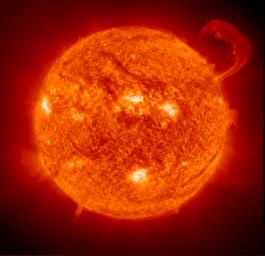Interesting Facts About the Sun
Here are some interesting facts about the sun that will help you better understand home solar power systems...
This page will answer these solar energy and solar power questions...
- How big is the Sun compared to the Earth?
- How much longer will the Sun continue to generate solar energy?
- How does the Sun generate solar energy?
- How does solar energy travel from the Sun to the Earth?
- How far away is the Sun from the Earth?
Here are some Sun facts that will give you a better understanding of solar energy.
In both size and mass, the Sun is the largest object in our solar system...

The Suns diameter is 864,938 miles. This is 109 times larger than the Earths diameter. In fact, the Sun is so large that 1.3 million Earths could fit inside of it!
In terms of mass, the Sun is 1.99 x 1030 kg, which is about 333,000 times as massive as the Earth. The Sun accounts for 99.8% of all the mass in our solar system. This is one of those facts on the Sun that most people dont realize.
The Sun will generate solar energy for another 5 billion years...

At 4.5 billion years old, our Sun is only about half-way through its life. In other words, its a middle-aged star that will continue shining for another 5 billion years.
Because of this, one of the more interesting facts about solar energy is that the Sun is essentially a limitless source of energy for us. It is the ultimate renewable energy.
The solar energy generated by the Sun is the result of nuclear fusion...

The Sun is a huge nuclear reactor. It is constantly converting hydrogen into helium using the process of nuclear fusion. Nuclear fusion joins smaller atoms together to form a larger atom.
In the case of our Sun, four hydrogen atoms are joined together to make one helium atom. The helium atom that is created has less mass than the four hydrogen atoms. This "lost" mass is the radiant energy that the Sun gives off into space. It is what we call solar energy.
Solar energy travels to the earth as electromagnetic waves...

The radiant energy produced by the Sun makes its way to the earth in the form of electromagnetic waves. These waves of energy travel to the earth at the speed of light.
The visible light we see is actually just a small part of the overall electromagnetic spectrum that this energy comprises. From radio waves to gamma rays, this energy is composed of different wavelengths. Radio waves are about the size of buildings whereas gamma rays are the size of atomic nuclei.
The Sun is 93 million miles away from the Earth...

Even though the Sun is the closest star to the Earth, it is still, on average, 93,000,000 miles away. Astronomers have classified this distance as 1 Astronomical Unit. This provides a standard way for measuring distances in the solar system.
Because Earths orbit is elliptical, the distance can be as close as 91 million miles or as far away as 94.5 million miles away. At these distances, it takes the light and other radiant energy generated by the Sun about 8 minutes to reach the Earth.
If you would like more facts about the Sun and solar energy, take a look at these pages...
Home > Facts About Solar Energy > Facts About the Sun



